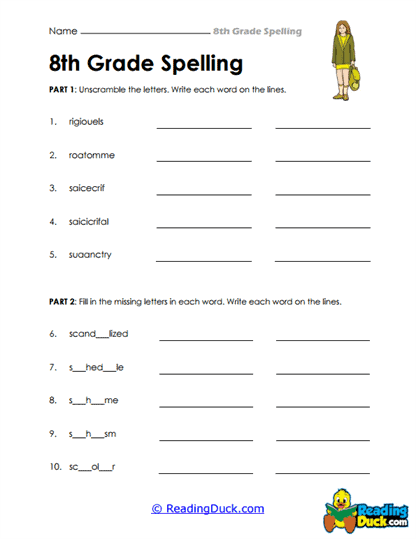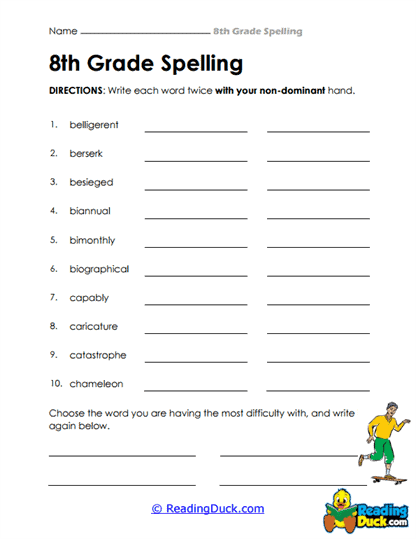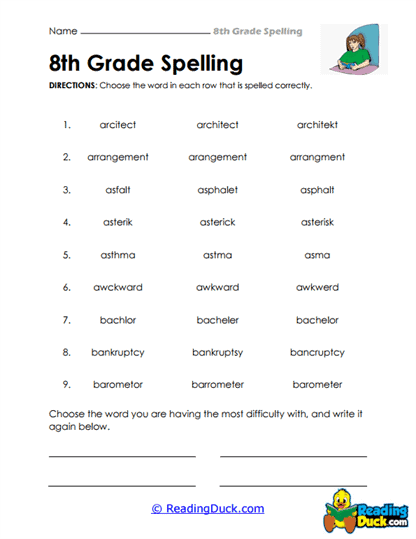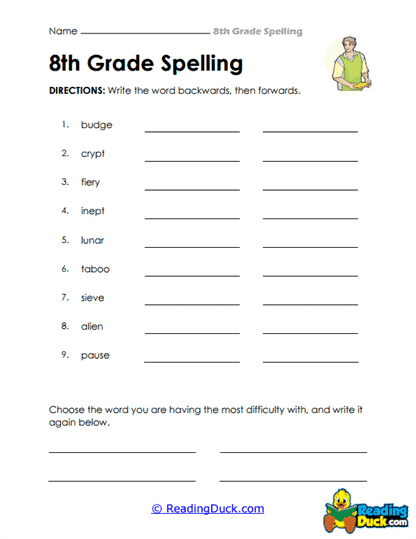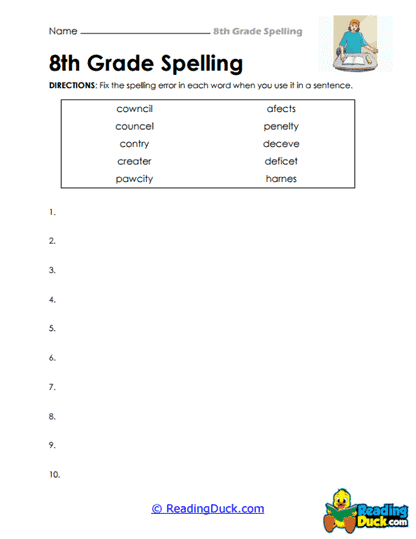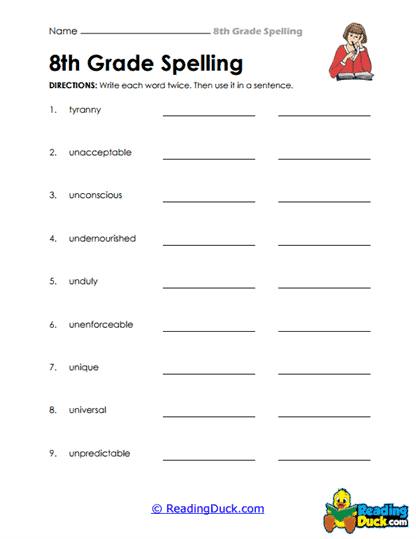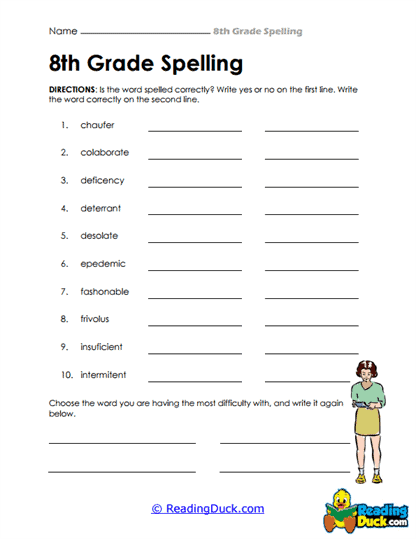8th Grade Spelling Worksheets
About Our 8th Grade Spelling Worksheets
Our collection of 8th Grade Spelling Worksheets, located within the Spelling category in the Skills section, provides comprehensive support for students as they advance their spelling abilities in preparation for high school. This collection focuses on reinforcing spelling patterns, expanding vocabulary, and mastering more complex words that are vital for success in both academic and everyday settings. Presented in a convenient PDF format, these worksheets are easy to view, download, and print for use in classrooms or home environments. Each worksheet comes with a downloadable answer key, ensuring that parents and educators can efficiently track student progress and provide constructive feedback.
Understanding 8th Grade Spelling: A Thorough Overview
Eighth-grade spelling marks a transition into more advanced language skills. At this level, students are expected to master intricate spelling patterns, develop a strong vocabulary, and understand the etymology of words. This builds a foundation for high school and beyond, where spelling and vocabulary play crucial roles in reading comprehension, writing proficiency, and communication. Let’s delve deeper into the elements that define 8th-grade spelling.
Complex Spelling Patterns
As students enter 8th grade, the spelling patterns they encounter become more intricate, requiring a higher level of linguistic understanding.
- Multisyllabic Words: Students work with longer, multisyllabic words, which require them to understand syllable division, stress patterns, and vowel combinations. For example, words like "miscommunication," "counterproductive," and "interchangeable" challenge students to apply spelling rules to manage multiple syllables and prefixes.
- Silent Letters and Double Consonants: Silent letters and doubled consonants add complexity. Words such as "acknowledge," "accommodate," and "ballet" include silent letters or double consonants that do not follow phonetic rules but are essential to correct spelling.
- Words with Latin and Greek Roots: Many 8th-grade spelling words are derived from Latin and Greek, which introduces specific patterns and suffixes. For example, students may encounter words like "photosynthesis" (Greek: photo- = light, synthesis = composition) or "benevolent" (Latin: bene- = good, volens = wishing). Understanding these roots aids in both spelling and word comprehension.
The Role of Etymology and Word Origins
At the 8th-grade level, a focus on word origins helps students understand why certain words are spelled the way they are. This approach not only reinforces spelling skills but also strengthens vocabulary and linguistic awareness.
- Latin and Greek Derivatives: A significant portion of the English language derives from Latin and Greek, which influences both spelling and meaning. For instance, words like "concurrent" (from the Latin root "currere," meaning to run) or "monologue" (from the Greek "mono," meaning one, and "logos," meaning word or speech) illustrate how understanding word origins helps students master complex words.
- Morphology: Eighth-grade students begin to explore morphology, the study of how words are formed through root words, prefixes, and suffixes. For example, learning that "bio" means life and "ology" means the study of allows students to spell and understand words like "biology" and "biotechnology."
Vocabulary Growth Through Spelling
Eighth-grade spelling instruction directly supports vocabulary development. As students work with more sophisticated words, they simultaneously enhance their ability to read, write, and communicate effectively.
- Synonyms and Antonyms: Vocabulary instruction often includes advanced synonyms and antonyms to expand linguistic understanding. For example, students might learn that "profound" is a synonym for "deep" and that "trivial" is an antonym of "significant." This deepens both vocabulary and spelling skills.
- Homophones and Homonyms: Mastering homophones (words that sound the same but have different meanings and spellings) and homonyms (words that are spelled the same but have different meanings) remains a focus. Words like "capital" (a city or financial resource) and "capitol" (a government building) challenge students to recognize context while spelling correctly.
Challenges in 8th Grade Spelling and How to Overcome Them
Eighth-grade spelling presents students with a set of challenges that stem from the complexity of the English language. However, these challenges can be effectively addressed through targeted strategies that support retention and comprehension.
Common Challenges
- Irregular Spelling Patterns: The irregularities in English spelling continue to pose challenges for students. For example, words like "chaos" and "colonel" defy typical phonetic rules, and students often struggle to spell them correctly without relying on rote memorization.
- Silent Letters: Words with silent letters, such as "debt," "rendezvous," and "subtle," can be confusing for students because the spelling does not match the pronunciation. Silent letters often reflect the historical origins of words but can still confuse learners.
- Foreign Borrowings: English borrows extensively from other languages, which often results in unfamiliar spelling patterns. Words like "bouquet" (from French), "fiasco" (from Italian), and "karaoke" (from Japanese) introduce non-English phonetic patterns that may be unfamiliar to students.
Strategies for Success
- Breaking Words into Syllables: Breaking down longer words into syllables can make spelling more manageable. For example, dividing the word "extraterrestrial" into "ex-tra-ter-res-tri-al" allows students to focus on each syllable and apply spelling rules more easily.
- Mnemonic Devices: Mnemonics help students remember tricky spelling patterns. For instance, a mnemonic like "Big Elephants Can Always Understand Small Elephants" can help with the spelling of "because." Additionally, acronyms and other visual or verbal memory aids reinforce spelling retention.
- Reinforcing Word Origins: Learning the etymology of words gives students insight into their structure. For example, explaining that "psychology" comes from the Greek words "psyche" (mind) and "logos" (study) helps students understand its spelling and meaning.
Defining Characteristics of 8th Grade Spelling
Eighth-grade spelling is defined by its focus on mastering challenging vocabulary, applying advanced spelling rules, and understanding word origins. This stage in spelling education sets the groundwork for high school, where accurate spelling plays a critical role in reading and writing across disciplines.
Key Features of 8th Grade Spelling
- Multisyllabic Words: Students focus on spelling longer words with multiple syllables, such as "antidisestablishmentarianism" or "misinterpretation." Mastery of these words requires understanding syllabic structure and stress patterns.
- Root Words and Etymology: An emphasis on root words, especially Latin and Greek derivatives, helps students break down and spell complex vocabulary. For example, recognizing that "trans-" means across and "port" means carry helps students spell and understand "transport" and "transcontinental."
- Mastering Homophones and Homonyms: Students continue to develop their ability to distinguish between words with similar sounds but different meanings or spellings, such as "there," "their," and "they're."
Sample 8th Grade Spelling List
- acknowledge
- benevolent
- perseverance
- simultaneous
- phenomenon
- rhetorical
- inevitable
- bureaucracy
- anticipation
- inconspicuous
Suggested Activities to Reinforce 8th Grade Spelling
To help students retain their spelling knowledge and make learning engaging, educators and parents can incorporate a variety of activities into their spelling instruction. These activities can be used both in the classroom and in homeschool settings, providing multiple avenues for students to practice and solidify their skills.
Classroom Activities
- Spelling Jeopardy: Create a game in which students must spell increasingly difficult words to earn points, modeled after the popular game show Jeopardy. This activity promotes friendly competition and motivates students to practice their spelling.
- Word Mapping: Have students create word maps that break down spelling words into their roots, prefixes, and suffixes. For example, the word "disintegration" can be broken into "dis-" (apart), "integr-" (whole), and "-ation" (process). This helps students visualize the structure and meaning of words.
- Spelling Bees: Conducting classroom spelling bees encourages students to practice their words aloud and helps build their confidence in spelling. This competitive yet educational environment fosters focus on spelling accuracy.
Homeschool Activities
- Flashcards with Etymology: Create flashcards that not only present the spelling word but also include its root origins and meanings. This dual focus helps students understand the word’s structure and significance while improving spelling.
- Sentence Creation: Have students write sentences or short paragraphs using their spelling words in context. This practice ensures they not only spell the words correctly but also understand how to use them in writing.
- Online Spelling Games: Engage students with interactive online games that test their ability to spell complex words and recognize patterns. Many online platforms offer spelling games that challenge students at an 8th-grade level.
The Practical Importance of Spelling in Academic and Personal Life
Mastering spelling at the 8th-grade level is essential for academic success and clear communication. As students progress to high school and beyond, accurate spelling becomes increasingly important in formal writing, whether for essays, research papers, or professional correspondence. Strong spelling skills also contribute to improved reading comprehension, enabling students to better grasp advanced texts across all subjects.
In personal life, the ability to spell correctly affects everyday communication, from writing emails and social media posts to creating resumes and job applications. Poor spelling can lead to misunderstandings or misinterpretations, making clear and precise spelling an essential life skill.
In conclusion, our 8th Grade Spelling Worksheets offer students the opportunity to develop a deep understanding of complex spelling patterns and word origins while expanding their vocabulary. By engaging with this collection, students enhance their spelling proficiency, paving the way for success in both academic and personal contexts. Spelling is more than just a mechanical skill—it is a key to effective communication and lifelong literacy.



